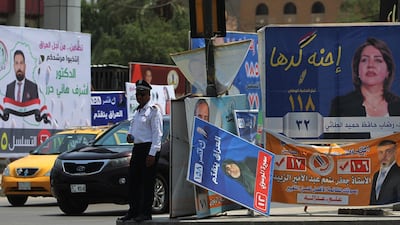Iraq's powerful top Shi'ite cleric suggested on Friday that he had not abandoned his opposition to ex-prime minister Nuri Al Maliki, who is bidding to return to power in elections on May 12.
Making a rare intervention in politics, Grand Ayatollah Ali Al Sistani used his weekly sermon to tell Iraqis they should "avoid falling into the trap of those ... who are corrupt and those who have failed, whether they have been tried or not".
Mr Al Sistani, whose opinion is sacrosanct for millions in Iraq's Shi'ite Muslim majority and beyond, said he was keeping an "equal distance" from all candidates and did not identify any of them by name in his sermon, read by one of his envoys, Sheikh Abdulmehdi al-Karbalai, and broadcast on television.
But the reference to Mr Al Maliki was clear from his mention of the collapse of security forces in the face of Islamic State militants in 2014, when Mr Al Maliki was in power.
Mr Al Sistani successfully blocked Mr Al Maliki from taking the premiership after winning the 2014 election, paving the way for the appointment of the current prime minister, Haider Al Abadi.
"Past electoral experiments were marked by failures, many of those who were elected or appointed to high positions in the government abused their power and took part in spreading corruption and squandering public money," Mr Al Sistani also said.
Mr Al Abadi successfully led the campaign to defeat Islamic State, last year recapturing the city of Mosul, their main stronghold in northern Iraq, with the backing of a US-led coalition.
The May 12 election is shaping up as a three-way contest between Mr Al Abadi, Mr Al Maliki and Hadi Al Amiri, a former transportation minister who bolstered his clout during the war on Islamic State as the commander of Shi'ite paramilitary forces aligned with Mr Al Abadi's government.
Mr Al Abadi, a Shi'ite, was quick to welcome Mr Al Sistani's sermon, tweeting his "total support for the instructions given by the Supreme Religious Reference at Friday prayers."
In a veiled reference to Mr Al Maliki, Mr Al Abadi added: "We note in particular (Mr Al Sistani's) call for the widest participation in the election and making the correct choice after reviewing the past record of candidates, mainly those who held official positions."
Mr Al Maliki's group in parliament, State of Law, also welcomed Mr Al Sistani's sermon as if it were not directed against him.
"State of Law welcomes Sayyid Sistani's speech which contains precious instructions and advice to all the children of the Iraqi people," it said in a statement.
The election victor will face daunting tasks of rebuilding the war-shattered country and a battle against entrenched corruption that is eating away at its oil revenue.
Mr Al Maliki, who holds the ceremonial position of vice-president, remains one of the most influential Shi'ite politicians in his capacity as leader of the Dawa party.
Though Abadi is a Dawa member, Mr Al Maliki declined to endorse him, and the competition between the two means they would need to seek the support of other Shi'ite parties, as well as Sunni and Kurdish groups, to form governing coalitions.
The prime minister heads Iraq's executive, a post reserved for Shi'ites under a power-sharing understanding put in place after the 2003 U.S.-led invasion that toppled dictator Saddam Hussein, a Sunni Muslim.
The unwritten accord gives Kurds the mainly ceremonial position of president of the Republic, while Sunnis fill the position of parliament speaker.

